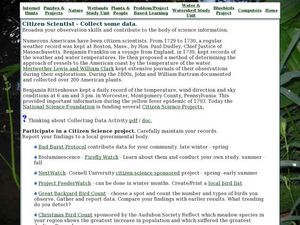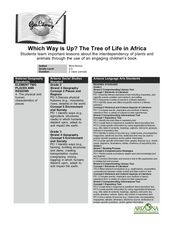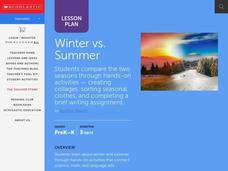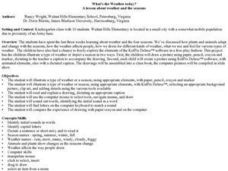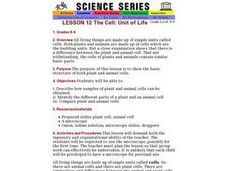Curated OER
White-tailed Deer Issues
Ninth graders examine the white tail deer population in Pennsylvania and explore the impacts that the deer have on the flora and fauna. In this white-tail deer lesson students complete an activity and graph their results.
Curated OER
Citizen Scientist - Collect Some Data
In this science project worksheet, students view a sheet of numerous science projects including weather, animals, flowers, and more. Students choose 1 project to do out of 22 projects total.
Curated OER
Which Way is Up? The Tree of Life in Africa
Students read a book titled This is the Tree about a baobab tree and draw a picture and label the tree. In this tree lesson plan, students also write a paragraph explaining why they drew that tree.
Curated OER
Amazon Rainforest: You Won't Find George in This Jungle
Students identify locations of rainforests, compare/contrast layers of the rainforest, construct and interpret maps and graphs, recognize relationships between man and the environment, and write about an imaginary walk in the rainforest.
Curated OER
Understanding Climate
Fourth graders create two dioramas out of household materials to compare the influence of various factors that impact climate. Each group discuss how the change in factors influenced the climate, flora, and fauna of their area.
Curated OER
Alien Invasion!
Students compare and contrast invasive, alien and native species. They research three problems that might be associated with invasive species. They describe how some invasive species came to be invasive and discuss what can be done about...
Curated OER
Prey or Pray? Could YOU Escape a Cheetah?
Tenth graders estimate the size of an adult cheetah by research and measurement of a picture. They determine the approximate distance and speed of the cheetah from a filmed chase and compare that to their own running speed.
Curated OER
Floating Pencil
Students discover how salt water makes a pencil float better than freshwater by measuring and comparing the lengths of the portion of the pencil that floats above the water surface. They then determine if an unknown water sample is...
Curated OER
Plastic Wrap
Young scholars compare the price and quality of different kinds of plastic kitchen wraps and then rank them from best to worst. They take into account how well it comes out of the roll, if it seals well, it is tangles, how much weight...
Curated OER
It Counts
Students assign numbers to describe objects. In this number activity, students assign numbers to objects and compare more, less, and equal values. They write down descriptions of plants including the number of leaves and height of the...
Curated OER
Winter vs. Summer
Young scholars explore the seasons. In this winter and summer lesson, students read The Snowy Day by Ezra Jack Keats and Summer by Maria Ruis. Young scholars compare the 2 seasons as they create t-charts, try on seasonal clothing, and...
Curated OER
Raindrops Keep Burning On My head
Students investigate the effects and causes of acid rain. They test pH of household items to familiarize themselves with pH scale and compare that information with acid rain solutions. They investigate impact of acid rain via internet...
Curated OER
What's Organic?
Students define and discuss terms organic and synthetic, read article pertaining to organic agricultural practices in Oklahoma, complete worksheet, grow plants using both commercial and organic fertilizer, compare growth rates, and chart...
Curated OER
Weather And The Seasons
Students illustrate characteristics of the different seasons using digital and pen and paper drawings. They creat captions for their drawings and present them to the class. Students compare and contrast their pen and paper drawing...
Curated OER
The More Things Change
Second graders discuss change in cities over time. They view pictures of a city as it has changed over time and then compare city pictures of the past to those of a modern city today. In preparing for a guest speaker who will come and...
Curated OER
Earthworm Dissection
Students identify the external features of the earthworm. They view a video about different features of an earthworm. They research information about annelids on the Internet. They compare and contrast the earthworm with another annelid.
Living Rainforest
Finding the Rainforests
From Brazil to Indonesia, young scientists investigate the geography and climate of the world's tropical rain forests with this collection of worksheets.
Curated OER
Plant and Animal Cells: Alike and Different?
Seventh graders create a mneumonic device and a graphic organizer about the parts of plant and animal cells. In this biology lesson students are introduced to the parts of the cells and then work in groups to create projects that teach...
Curated OER
Biomes and Plant Growth
Seventh graders design four biomes models and plant three types of seeds in them to observe growth. In groups for each type of biome, they predict the seeds' growth in each of the settings. Students follow the conditions on a biome chart...
Curated OER
The Cell: Unit of Life
Students identify the parts of plant and animal cells, how samples can be obtained and what the differences are.
Curated OER
MAKING THREE DIMENSIONAL PLANT AND ANIMAL CELLS
Students create two different cells, one plant and one animal. In this plant and animal cell lesson plan students form groups and construct a part of a cell. Students then put them all together to form one plant or animal cell.
Curated OER
Oceanography
Second graders identify saltwater and freshwater habitats and the resources found in them. They compare and contrast the two habitats and discuss their findings. They discover the resources bodies of water can provide.
Curated OER
Science: Putting Down Roots
Fourth graders, in small groups, observe plants and note their characteristics. After drawing pictures of the plants, including their roots systems, they hypothesize in which environments the plants would best thrive. Finally, 4th...
Curated OER
Harvesting and Threshing the Seed
Learners harvest and thresh the seeds. They count the seeds and compare that number with the original number of seeds planted (8) to determine their profit or loss. Finally, students think about additional questions they have about...



